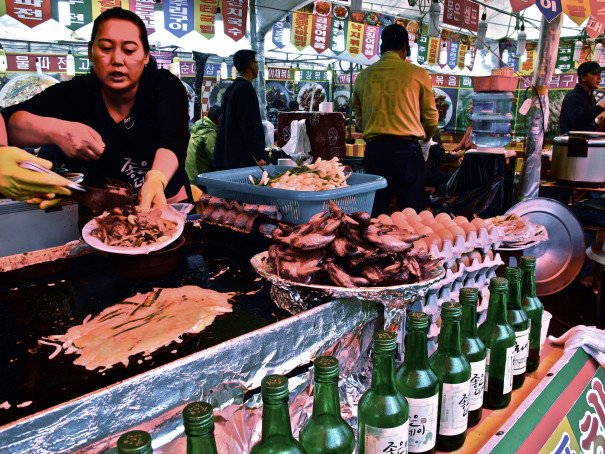
Bond Most Effectively Soldered With Alcohol

Bond Most Effectively Soldered With Alcohol
Soju in South Korea
The morning after would be bad for me. I knew this about halfway into the night—only my third in South Korea—and a quarter of the way into my fourth serving of soju. I shared my concerns with the person sitting next to me, a 50-something man with kind, crinkly eyes and a mop of black hair, who had a tambourine perched atop his thigh and a microphone resting on the liquor-laden table before him. “I don’t want to show up drunk to teach the students,” I laughed, though I was very serious. As the first foreign English teacher at an all-girls’ Methodist school in Suwon’s most conservative district, I didn’t want to make my name by scandalizing 500 middle-schoolers and the upstanding men and women who taught them.
The man beside me, Mr. Kim, smiled, nodded, then raised his shot glass exuberantly toward me. “Kun bae!” (cheers!) he said. Mr. Kim—had just finished belting out a heavily accented, and wholly enchanting, rendition of “Dancing Queen” during a round of noraebang, or Korean karaoke. He was now throwing back a shot of soju and encouraging me to do the same. But Mr. Kim was not an old friend, or new friend, or even friend of a friend. He was my boss. And tomorrow would be my second day of work.
The next morning, I woke in my tiny fifth-floor studio to a slicing headache and vague memories of ABBA, as well as the scent of kimchi wafting, invasively, through my open window. I hadn’t yet acquired a taste for the fermented stuff, so the brine and spice combined with my 6 am hangover made my stomach turn. I hoisted myself out of my narrow bed and shuffled to the bathroom. I didn’t know how to warm the water without simultaneously turning on the heated flooring, and seeing it was the height of summer, I settled for a cold shower.
So, yes, the morning after was indeed bad for me. But it was far worse, I was sure, for the dapper-but-disheveled gentleman outside my apartment complex. Not ten steps from my front door, I was shocked to find a middle-aged man, passed out, splayed like a splattered bug, black suit stained and dress shoes untied. Had his boss gotten him loaded, too?
Twenty minutes later, walking into the school’s teachers’ room, I was met with a chorus of cheers from my fellow noraebang-ers. They beamed as they told their colleagues what a champ I’d been, and neither the principal walking past nor the students milling about could dampen their telling. Mr. Kim’s voice was bright and unfettered: no hushed tones, no shame. I sheepishly scanned the room to gauge reactions. But I wasn’t met with any frowning or balking or headshaking. Everyone simply smiled. It seemed drinking didn’t carry that negative connotation of wildness and promiscuity it so often does in the U.S. No, in Korea, drinking is drinking—normal and reliable, woven into the Korean way, and tied to the small pleasures and triumphs of everyday life.
It wasn’t that Mr. Kim had gotten me drunk just to have a good time. It was that he’d sought to welcome me to his school, and to his country. He’d wanted to forge with me a bond, the kind that, when accounting for the obstacles of different languages and cultures, is most effectively soldered with alcohol. And I like to think, too, that he’d wished to arm me with a bit of know-how, something close to wisdom, about how a stranger like me could feel at home in this strange place.
In Korea, my deepest feelings of foreignness weren’t rooted in being a foreigner, but in being a Korean. Adopted by an adoring Midwestern American couple when I was two, I ventured back at age 22. At first, I felt like the subject in a nature-versus-nurture experiment. Would I pick up the language quickly because I’d been born there? Were my tastes predisposed to Korean sensibilities? Was a love for kimchi hardwired in my genes? The answers to these questions were no, no, and no, which was not at all surprising, yet somehow still disappointing.
But, there was one thing: I did like alcohol, and I did know how to consume it (thank you, Wisconsin), and so drinking became my way in. With it, I was connected. An adventurous imbiber, I was eager to try every variety of Korea’s spirits and learn every ritual associated with them. I liked the tradition of pairing certain alcohols with certain foods, always drinking soju with grilled samgyeopsal and beer with Korean fried chicken.
I found it charming that climbing a mountain meant celebrating with a cup of makgeolli at its summit. I delighted in the whimsy of Korea’s drinking culture—the “one-shot” games; the winding wonderland that is the Hongdae club scene; the to-go cocktails packaged in plastic Capri Sun-like pouches. I cherished the weightiness of it, too—the centuries of history poured along with each drink; the ancient belief that sul, or fire water, is a gift from the gods, a divine way to reach spiritual balance; the customs of pouring your elders’ drinks with two hands and looking away as you sip yours. It all made me feel like a part of something.
In the four years I would spend in Korea, I’d never again drink so intimately with Mr. Kim. Today, almost three years after leaving, I’m not even sure I could tell you his first name. But I can imagine that if I were to go back tomorrow and find Mr. Kim and say, “Let’s have some soju and sing ABBA,” he’d flash me a grin and reply “Kun bae!”